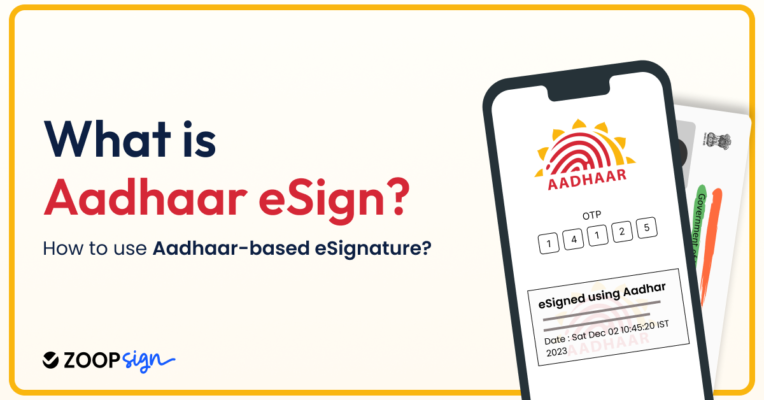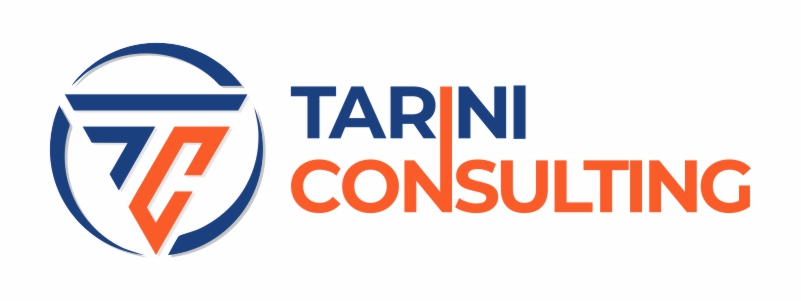In the fast-paced digital age, where businesses are continually evolving, the need for efficient and secure electronic signatures has become paramount. In India, the advent of Aadhaar eSign has played a pivotal role in revolutionizing the way documents are signed electronically.
This blog post explores the concept of Aadhaar eSign, its legality, advantages, features, and challenges, with a particular focus on its integration with Zoho Sign. Additionally, we will delve into real-life use cases of e-stamping in India before concluding with a spotlight on Tarini Consulting, a Zoho Authorized partner specializing in Zoho consulting, implementation, and customization.
Aadhaar eSign: A Conceptual Overview

Aadhaar eSign is a government-approved method of electronically signing documents using Aadhaar credentials. Aadhaar, the unique 12-digit identification number issued by the Unique Identification Authority of India (UIDAI), serves as a digital identity for residents of India. Aadhaar eSign leverages the digital signature infrastructure provided by the UIDAI to authenticate signatories and ensure the integrity of the signed documents.
Legality of Aadhaar eSign: The Legal Framework
The legal foundation of Aadhaar eSign can be traced to the Information Technology Act, 2000, with specific amendments made in 2008 and 2015. Section 3 of the IT Act recognizes electronic signatures as legally valid, provided they adhere to the prescribed authentication process. Aadhaar eSign aligns with these regulations, offering a secure and legally acceptable method for electronic signatures.
Furthermore, the legality of Aadhaar eSign is reinforced by the Aadhaar (Authentication) Regulations, 2016, which delineates the standards and procedures for secure authentication. Under Section 4 of the Aadhaar Act, 2016, the government has mandated the acceptance of Aadhaar eSign as a valid electronic signature.
Advantages of Aadhaar eSign
- Legally Binding: As mentioned, Aadhaar eSign adheres to the legal framework established by the IT Act and Aadhaar regulations, ensuring the legality and validity of electronically signed documents.
- Convenience: Aadhaar eSign eliminates the need for physical presence, allowing users to sign documents remotely. This convenience is particularly beneficial in today’s globalized and remote working environments.
- Cost-Efficient: Traditional paper-based signatures involve various costs such as printing, shipping, and storage. Aadhaar eSign drastically reduces these expenses, making it a cost-efficient alternative.
- Authentication Security: Leveraging the Aadhaar infrastructure ensures robust authentication, enhancing the security of electronic signatures.
- Time-Efficient: With Aadhaar eSign, signing documents takes minutes, reducing the time-consuming process of physical signatures.
Features of Aadhaar eSign:
- Biometric Authentication: Aadhaar eSign incorporates biometric authentication, adding an extra layer of security by verifying the user’s identity through fingerprint or iris scans.
- OTP Authentication: Users can also authenticate their signatures using a One-Time Password (OTP) sent to their registered mobile number, further securing the signing process.
- Non-Repudiation: Aadhaar eSign ensures non-repudiation, meaning signatories cannot deny their involvement in the signing process.
- Document Encryption: The signed documents are encrypted, safeguarding them from unauthorized access and maintaining their integrity.
Real Life Use Cases of Aadhar eSign:
Aadhaar eSign has found practical applications across diverse industries, streamlining processes and enhancing efficiency. Here are some real-life examples of the usefulness of Aadhaar eSign in different sectors:
1. Banking and Financial Services:
- Loan Agreements: In the banking sector, Aadhaar eSign is extensively used for remotely signing loan agreements. Borrowers can digitally sign loan documents, reducing the need for physical paperwork and expediting the loan approval process.
- Account Opening: Aadhaar eSign simplifies the process of opening bank accounts. Customers can digitally sign account opening forms, making the onboarding process smoother and more accessible, especially for those in remote areas.
2. Government Services:
- Government Permits and Licenses: Aadhaar eSign facilitates the digital signing of various government permits and licenses. This includes applications for business permits, driving licenses, and other official documents, reducing bureaucratic delays and enhancing transparency.
- Public Distribution Systems: In welfare programs, Aadhaar eSign ensures secure authentication in the distribution of subsidies and benefits, minimizing fraud and ensuring that the intended recipients receive their entitlements.
3. Real Estate:
- Property Transactions: Aadhaar eSign plays a crucial role in the real estate sector, enabling remote signing of property-related documents such as sale deeds, rental agreements, and lease contracts. This accelerates the property transfer process and minimizes the need for physical presence.
- Digital Notarization: Legal documents related to real estate transactions, like property deeds, can be digitally notarized using Aadhaar eSign, reducing the time and effort traditionally associated with notarization.
4. Healthcare:
- Medical Consent Forms: In healthcare, obtaining patient consent is a routine process. With Aadhaar eSign, hospitals and clinics can digitize the forms, allowing patients or their representatives to sign electronically, ensuring a swift and secure consent process.
- Telemedicine Consultations: Aadhaar eSign facilitates the signing of telemedicine consent forms, enabling patients to receive remote medical consultations with verified electronic signatures, ensuring compliance with regulations.
5. Telecommunications:
- Mobile Connections: Aadhaar eSign simplifies the process of obtaining a new mobile connection. Subscribers can digitally sign the required documents, making the onboarding process faster and more accessible.
- Service Contracts: Telecom companies use Aadhaar eSign for customers to digitally sign service contracts and agreements, enhancing the efficiency of contract management.
In conclusion, the fusion of Zoho Sign and Aadhaar eSign in India marks a significant leap towards a paperless, efficient, and legally sound era of electronic signatures. While challenges exist, the advantages and features of Aadhaar eSign, coupled with the tools like Zoho Sign, pave the way for a seamless and secure digital signature experience in the Indian business landscape. As businesses adapt to the changing dynamics of the digital world, Aadhaar eSign emerges as a reliable and transformative tool, bridging the gap between traditional signatures and the demands of a modern, connected economy.
Tarini Consulting: Navigating the Zoho Sign Landscape

As businesses embrace digital transformation, the role of trusted partners becomes indispensable. Tarini Consulting, as a Zoho Authorized partner, stands at the forefront of guiding businesses through the complexities of Zoho Sign integration and customization. Specializing in Zoho consulting, implementation, and customization, Tarini Consulting ensures that organizations harness the full potential of Zoho Sign while complying with legal frameworks like Aadhaar eSign.